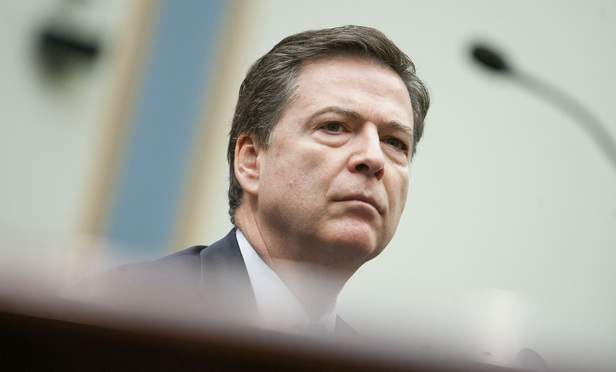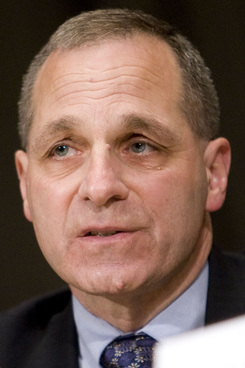 James Comey. (Photo: Diego M. Radzinschi/ALM)
James Comey. (Photo: Diego M. Radzinschi/ALM)
Citing his handling of the investigation into Hillary Clinton’s email server, President Donald Trump on Tuesday fired FBI Director James Comey.
The decision marks only the second time an FBI director has been fired by the president in more than three decades. The sudden news, announced via a White House press release, shocked lawmakers, political pundits and the legal community.
“This is big news. Big news,” said Stephen Ryan, a partner at McDermott Will & Emery and a former federal prosecutor in Washington, D.C. “I don’t think he had the confidence of the American public anymore. In truth, it was probably time for him to go, although this is quite abrupt and interesting in itself.”
Dechert partner David Kelley, Comey’s successor as U.S. attorney for the Southern District of New York, said simply in an email: “The canary in the mine has died.”
A memo from Deputy Attorney General Rod Rosenstein said Comey was “wrong to usurp” the attorney general’s authority last July when he announced the closure of the agency’s Clinton investigation. Rosenstein’s letter to Attorney General Jeff Sessions also said Comey “ignored another longstanding principle” by holding a press conference to “release derogatory information” about Clinton.
“The director laid out his version of the facts for the news media as if it were a closing argument, but without a trial,” Rosenstein wrote. “It is a textbook example of what federal prosecutors and agents are taught not to do.”
The letter further criticized Comey’s decision in October, shortly before the election, to tell Congress that the investigation had been reopened to search more emails.
Following Comey’s termination, Andrew McCabe, his deputy, became acting FBI director.
Ryan said picking the next director will be “absolutely critical.” He suggested a pick from the judiciary or a career prosecutor, someone “who’s neither red or blue.”
“Anyone with a partisan political career is not appropriate,” Ryan said.
Liberal advocacy groups and Democrats urged further scrutiny of Comey’s termination.
“The terms of FBI directors were purposefully structured to span across sitting presidents to ensure the FBI’s independence and insulate the bureau from partisan politics,” Anthony Romero, the American Civil Liberties Union executive director, said in a statement. “President Trump’s dismissal of Comey raises questions about the administration’s inappropriate meddling in bureau operations—precisely at a time when the bureau appears to be investigating the president, his advisors, and his campaign for potential collusion with Russian agents in our last election.”
Comey, a former deputy attorney general who left the Justice Department in 2005, joined Lockheed Martin as general counsel. He had been general counsel to hedge fund Bridgewater Associates L.P. in Connecticut before his nomination to lead the FBI. Comey in March 2013 was appointed to the board of HSBC Holdings PLC.
Comey’s actions may weigh heavy on his future employment prospects, as big law firms may be wary of questions that would accompany his hiring. Still, as a prominent attorney with high-level experience in government and business, he may find a home at a law firm, as some other former FBI directors have.
Where do former FBI directors go after leaving the bureau? Here’s a look at the career paths of several past directors.
 Robert Mueller.
Robert Mueller.(Photo: Diego M. Radzinschi/ALM)
Robert Mueller III served more than a decade at the FBI—taking the helm at the bureau one week before the Sept. 11, 2001, terror attacks. “I love prosecuting cases, and I love doing investigations, particularly homicide investigations and the like, and that’s why I became a prosecutor,” he told reporters in 2013. “I did not expect to be spending my time preventing terrorist attacks.”
Obama asked Congress in 2011 to let Mueller serve another two years at the bureau. Mueller left the FBI in 2013, joining Wilmer Cutler Pickering Hale and Dorr in Washington as a partner the next year. (Mueller described Comey as an “excellent choice” and a “superb prosecutor.”)
In hiring Mueller, Wilmer’s co-managing partner, Robert Novick, said at the time: “We fully expect companies that are not current clients at the firm will reach out to him for advice, and that companies who are already clients at the firm will reach out to him for his expertise.”
Mueller last year was picked to oversee settlement negotiations in the class actions filed over Volkswagen A.G.’s emissions scandal.
 Louis Freeh. (Photo: NLJ/Diego M. Radzinschi)
Louis Freeh. (Photo: NLJ/Diego M. Radzinschi)
Louis Freeh was the FBI director from September 1993 to May 2001, when he announced his retirement. “I have neither engaged in negotiations regarding any future employment nor have I requested others do so on my behalf while serving as director,” Freeh said then. “As for the future, I look forward to spending the summer with my family and engaging in new challenges.”
Freeh served as general counsel to the credit card issuer MBNA from 2001 to 2006. He later founded the firm Freeh Sporkin & Sullivan and the consultancy Freeh Group International Solutions.
Penn State University in 2011 picked Freeh to lead the university’s investigation into the child sex-abuse allegations against a former assistant football coach.
The law firm Pepper Hamilton acquired Freeh’s firm and consulting group in 2012, and within months he was named chairman of Pepper Hamilton. Last year, Freeh left the firm to rejoin Freeh Sporkin. Freeh in June is scheduled to deliver the LSU Paul M. Hebert Law Center’s 2017 commencement address.
William Sessions, nominated in 1987 by President Ronald Reagan, was terminated in 1993—six years into his tenure—over questions about his performance. Since 1973, according to one congressional report, Sessions had been the only FBI director removed from office—until today. After his termination, Sessions and a son started the San Antonio, Texas, firm Sessions & Sessions.
Sessions & Sessions joined Holland & Knight in 2000, where the former FBI director was a partner. The firm later honored him with its Chesterfield Smith Award, the highest individual recognition given to a partner. He wasn’t reached for comment Tuesday.
At the time Sessions was fired, President Bill Clinton cited “serious questions … about the conduct and the leadership of the director.” The New York Times reported then that Sessions “stubbornly rejected an administration ultimatum to resign” following an internal ethics report that detailed alleged transgressions. “With a change in management in the FBI, we can now give the crime fighters the leadership they deserve,” Clinton said in 1993.
Sessions was defiant until the end. “Because of the scurrilous attacks on me and my wife of 42 years, it has been decided by others that I can no longer be as forceful as I need to be in leading the F.B.I. and carrying out my responsibilities to the bureau and the nation,” Sessions said then, according to the NYT. “It is because I believe in the principle of an independent F.B.I. that I have refused to voluntarily resign.”
Andrew Denney in New York and Mike Scarcella in Washington contributed to this report.
Related Articles:




